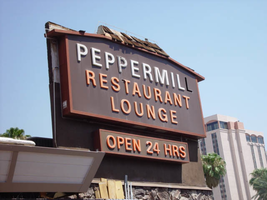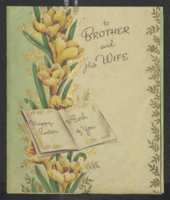Search the Special Collections and Archives Portal
Search Results

Meeting minutes for Consolidated Student Senate, University of Nevada, Las Vegas, March 10, 2000
Date
Archival Collection
Description
Text

Photographs of Peppermill signs, Las Vegas (Nev.), 2002
Date
Archival Collection
Description
Site address: 2985 S Las Vegas Blvd
Sign details: The Peppermill Inn Restaurant is located on the east side of Las Vegas Blvd, just north of the now defunct Silver City Casino. The actual establishment faces west toward the strip, separated from the traffic by the front parking lot. The lowrise brown clad establishment, boasts three specific pieces of signage on the exterior structure. In the parking lot near Las Vegas Blvd, a small two-sided, ground level cabinet, mirrors the aesthetics of the actual structure. Upon the west side of the building, the shingled roofline boasts channel letters filled with neon, as well as a more secluded sign on the north side of the building, toward the rear.
Sign condition: Structure 3 Surface 3 Lighting 3 The condition of the three different pieces of signage are all in different states of repair.
Sign form: Pylon; Fascia
Sign-specific description: The pylon sign, which sits near the street, is a miniature representation of the facade of the Peppermill establishment. Two square legs, constructed of mortared pieces of stone support the two-sided cabinet. The horizontal, rectangular cabinet sits on the pole, and faces north/south. The top edge of the sign is reminiscent of a roofline, with a low rise a-frame design. The grade is very little but exaggerated by the rectangular element rising off of the top edge covered in brown wooden shingles, which also cover the top edge's surface. The effect of the top's finishing is the resemblance of the roof of the Peppermill restaurant. Just below the peak of the "roof-like" element on the surface of the sign, a rectangular metal plate possesses text. The text is stamped out of the metal to reveal recessed negative spaces of fonts. An orange transparent material resides behind the plate, providing the hue for the internally lit apparatus. The text reads "24 Hours" in all capitals. Below the small rectangle, larger, white text runs the length of the sign. The internally lit, closed face, channel letters are in all capitals. In smaller text, along the bottom portion of the face the phrase "Coffee Shop & Lounge," runs the length of the text. The letters are orange, closed faced, internally lit. The actual structure of the restaurant, further east on the property is the model for the previously mentioned sign. The low-rise pitched roofline of the facility concludes at a lowrise rectangular cap. Along the western edge the roofs overhang, large white channel letters lined on the interior with pink neon spell "Peppermill" in all capital letters. Following the brown shingled roofline around the south side of the building, a third sign, not seen by the general public, faces south. A steel cabinet is the two-dimensional representation of both the outer pylon sign as well as the structure itself. A rust colored brown cabinet houses a dork brown steel face, with plastic letters for the advertising of the establishment. "Peppermill" is spelled in all capital letters. Below the top text a two lined, series of orange all capital text spells "Restaurant Lounge." It is apparent that wooden shingles were evident on the top the top edge of the cabinet which rises in the pitched front geometric shape seen on the pylon in the front and the architectural element in the structures center. Underneath the primary cabinet a smaller, horizontal, rectangular cabinet, sits centered underneath the It too is a rust colored brown cabinet, with a dark brown face. Text, as tall as the cabinet spells, "Open 24HRS" in orange plastic all capital letters.
Sign - type of display: Neon; Incandescent; Backlit
Sign - media: Steel; Plastic; Masonry
Sign - non-neon treatments: Graphics; Paint
Sign animation: Chasing, flashing, oscillating
Notes: The text, which resides on the southern wall and reads "Casino," is filled with incandescent bulbs that all illuminate at the same time, and oscillate. They then shut off at the same time, and then repeat. The raceways of incandescent bulbs chase each other while the neon, which surrounds the back lit, plastic, screens on this wall flash on then off. The bottom two raceways sandwiching the reflective panel chase from left to right, while the remainder of the raceways surrounding the signs, run right to left. The incandescent bulbs on the pylon chase each other gracefully up the length of the pylon. The animation is patterned so as to appear as if a section of several bulbs are pulsing its way up the towers, hugging the edge of the bulbous tops. The raceways continue around the east face of the building. The umbrellas in the plaza behind the pylon, also are animated with incandescent bulbs chasing each other downward along the raceways.
Sign environment: The area surrounding the Peppermill contains several interesting properties making the entire area sort of a cove of history. Just to the north the deteriorating, and closed Silver City stands testament to the wave of constant change present on the strip. It is a reminder of the historical significance of the Peppermill and the fact that someday it might not be present at this location any more.
Sign manufacturer: YESCO
Sign - thematic influences: What is evident of the Peppermill theme works around the exterior appearance, and around the name itself. The brown wooden exterior, use of wooden shingles as adornments, and the major color palette all suggest the rustic, if not old west referenced, aesthetic.
Sign - artistic significance: This has become a statement of the "old Vegas" of the 1970s.
Surveyor: Joshua Cannaday
Survey - date completed: 2002
Sign keywords: Pylon; Fascia; Neon; Incandescent; Backlit; Steel; Plastic; Masonry; Paint; Graphics
Mixed Content

Nathalie Martinez oral history interview: transcript
Date
Archival Collection
Description
Oral history interview with Nathalie Martinez conducted by Rodrigo Vazquez and Barbara Tabach on June 24, 2021 for Latinx Voices of Southern Nevada Oral History Project. Nathalie Martinez, one of the original members of the Latinx Voices project team, dicusses her personal history and the history of her parents who immigrated to the United States from Colombia and El Salvador. She shares her educational background and experiences working as an interviewer for the Latinx Voices project before its culmination and her graduation in 2021. Nathalie also talks about her work on the project's podcast and her work linguistically translating the interviews from Spanish to English.
Text

Mabel Hoggard: greeting cards (folder 3 of 3)
Date
Archival Collection
Description
Folder of materials from the Mabel Hoggard Papers (MS-00565) -- Personal papers file. This folder contains greeting cards, postcards, letters, and invitations from friends, family, and some organizations.
Mixed Content

Danny Cluff oral history interview: transcript
Date
Archival Collection
Description
Oral history interview with Danny Cluff conducted by Claytee D. White on December 8, 2017 for the Remembering 1 October Oral History Project. In this interview, Danny Cluff discusses his attendance at the Route 91 Harvest music festival on the evening of the October 1, 2017 mass shooting in Las Vegas, Nevada with his friends and nephew. He talks of finding safety in Hooters with other survivors from the concert. When speaking of gun control, he discusses his perspectives on human nature, citing his experiences during and after the concert shooting. Throughout the interview, Cluff speaks of the ways he has healed and kept positive after the shooting, such as laughing through the hard times and writing poetry, of which he gives a few samples.
Text

Rabbi Sanford Akselrad oral history interview: transcript
Date
Archival Collection
Description
Oral history interview with Rabbi Sanford Akselrad conducted by Barbara Tabach on March 7, 2018 for the Remembering 1 October Oral History Project. In this interview, Rabbi Sanford Akselrad discusses the response of the Jewish community of Congregation Ner Tamid to the October 2017 mass shooting in Las Vegas, Nevada. He discusses the healing service he led the day after the shooting, how the community paid respect to the victims, and the concert held to raise money. In addition to the actions of the Jewish community, Rabbi Akselrad discusses the congregation's work with the interfaith community to heal from this tragedy.
Text
Tamara Pickett Papers
Identifier
Abstract
The Tamara Pickett Papers (1977-1998) are comprised of materials related to the experiences of transgendered individuals in America. The collection includes transgender publications, scientific articles about sex reassignment surgery, and informational material provided to Pickett from various doctors as she planned her own sexual reassignment surgery.
Archival Collection
Jack Anderson Professional Papers on Operation Life
Identifier
Abstract
Materials in this collection (1969-1989) document various endeavors of the Operation Life organization. They include original correspondence, meeting minutes, news clippings, medical programs, grant applications, legal and financial documents, brochures and pamphlets, and other materials that provide context on the kinds of services provided by Operation Life. These files were kept by Jack Anderson in the course of his work as attorney for Operation Life.
Archival Collection
Katherine L. Rankin oral history interview
Identifier
Abstract
Oral history interview with Katherine L. Rankin conducted by Claytee D. White on June 16, 2014 for the Boyer Early Las Vegas Oral History Project. In the interview, Rankin discusses her childhood, her move to Las Vegas, Nevada, and her career as a librarian. Rankin talks about how she began her library career on the Gila River Reservation in Arizona before accepting a position as an audio and visual materials cataloger at University of Nevada, Las Vegas (UNLV) in the 1970s. Rankin later describes her work with the American Library Association, getting tenure at UNLV, and her role as a map cataloger in UNLV Special Collections and Archives.
Archival Collection

Stephen Round oral history interview: transcript
Date
Archival Collection
Description
Oral history interview with Stephen Round conducted by Claytee D. White on October 25, 2017 for the Remembering 1 October Oral History Project. In this interview, Stephen A. Round, a career military contractor, describes his experiences during the 2017 mass shooting in Las Vegas, Nevada. Round mentions moving to Las Vegas in 2013 and in later years staying at the Aria on the evening of October 1. He describes the chaos of the shooting and the 12-hour-plus lockdown at the Aria hotel and casino. The day after the shooting, Round built a memorial around the shooting site and protected it. Once the memorabilia of that first site was taken to the Clark County Museum, he moved to protect the second memorial at the "Welcome to Las Vegas" sign where crosses devoted to the victims had been placed. Along with his preservation of the memorials, Round describes his preparation of a book that was signed by many who visited the sites. Round explains that he was able to see some of the best and worst of humanity during those days of watching and caring for the memorial sites as well as helping any victims, families of the victims, and sympathizers of the Las Vegas 2017 shooting.
Text
